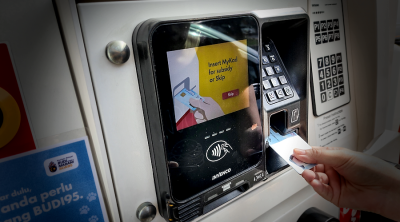
Despite a lull in terrorist attacks on Malaysian soil for the past few years, the spread of extremist ideologies, particularly through social media platforms, has resurfaced with the reveal and arrests of individuals linked to terrorism.
In June alone, five terrorism-related incidents were reported, including the possession of IS-related materials, attempted production of explosives, spreading of IS ideologies on social media, and threatening high-profile dignitaries.
These accounts emerged just a month after the Ulu Tiram police station attack, the second IS-related terrorist attack in Malaysia — the first being the Movida bar attack in 2016.
With most offenders using social media as the primary tool for their illegal activities, the true scale of online terrorist schemes likely remains hidden from law enforcement authorities and the public.
In fact, 98 per cent of terrorist supporters in Malaysia were recruited online, primarily targeting young people aged 18 to 39, according to the Special Branch Counter Terrorism Division (El-Muhammady & Wan Mohd Nor, 2021).
The enforcement of anti-terrorism legislation alone, such as the Prevention of Terrorism Act 2015 (POTA) and the Special Measures Against Terrorism in Foreign Countries Act 2015 (SMATA), has proven insufficient to deter individuals from engaging in online terrorist activities.
If not effectively addressed and intercepted, these schemes could threaten civilian safety and undermine Malaysia’s national security.
Therefore, authorities must strengthen efforts to detect and prevent such incidents, while also implementing rehabilitation programs to avert recidivism and support the reintegration of released convicts into society.
The report by the Institute of Youth Research Development in 2018 showed that the Internet, specifically social media platforms such as Facebook, Telegram and YouTube, served as the primary source of information and recruitment for 85 per cent of the 39 participants charged under anti-terrorism laws.
The shift from physical to online recruitment is largely driven by Malaysian law enforcement’s aggressive crackdowns on IS foreign fighters and followers.
In response, IS recruiters have shifted focus to building a base of home-grown supporters in Malaysia (instead of luring them to Syria), leading to a concerning rise in isolated actors carrying out terrorist attacks independently or in small groups.
Through social media, Malaysian IS followers are exposed to jihadist ideologies, battlefield tactics, weapon-making, and other expertise shared by Malaysian foreign fighters deployed in conflict zones.
A notable example is Muhammad Wanndy bin Mohamed Jedi, Malaysia’s most notorious IS member, who used Telegram to recruit and radicalise sympathisers, culminating in the Movida bar attack.
Noteworthy, several individuals arrested for terrorist activities earlier this year had previously been indicted for similar offences.
Evidently, recidivism is a recurring theme among Malaysian IS sympathisers.
Apparently, there is a need for the Malaysian Communications and Multimedia Commission (MCMC) to intensify digital surveillance and data collection on social media to trace online terrorist networks, especially on platforms favoured by these groups.
The use of artificial intelligence (AI) security applications as content monitoring tools to identify, analyse, predict, and remove terrorism-related content is a proactive approach to curb the spread of radical ideologies.
For instance, IBM Watson can analyse and visualise vast amounts of online data, making it ideal for detecting cyberterrorism patterns (Ogunlana, 2019).
Similarly, AI tools such as image-matching, text-based signal analysis, and cluster connections detection can help identify and discard terrorist communications (Davis, 2021).
The MCMC could mandate the use of these AI-based security applications by leveraging the new regulatory framework, which requires social media and internet messaging service platforms with over eight million users in Malaysia to apply for a licence starting next year.
Following the arrest of Telegram’s founder, Pavel Durov, it was announced that user data, including IP addresses and phone numbers, would be shared with authorities upon legal request.
This presents a valuable opportunity for law enforcement authorities to collect social media data in consolidating investigative efforts.
Nonetheless, these efforts must adhere to the United Nations Guiding Principles on Business and Human Rights (UNGPs) and the Global Network Initiative (GNI) principles to safeguard users’ privacy rights.
Data handovers must be transparent, communicated through public service announcements, online articles, and press releases.
Service providers should also publish information on their websites or in reports detailing the legal basis of requests made by authorities and the percentage of requests they complied with (ASEAN Regional Coalition to Stop Digital Dictatorship, 2022).
Although some IS recruiters lack formal religious education, they often mask their indoctrination of violent extremist ideologies under the guise of religion.
Therefore, in Malaysian context, greater emphasis should be placed on educating Muslims how to identify legitimate religious authorities and distinguish between orthodox and deviant teachings.
The absence of a standardised curriculum, learning materials, and teaching methodologies in Malaysia’s Islamic Religious Education (IRE) has led to inconsistencies in educational quality among institutions (Jamil, et al., 2024).
If unaddressed, this could leave a serious loophole for deviant religious beliefs to emanate.
Hence, the Ministry of Education (MoE), the Department of Islamic Development (JAKIM) and The State Islamic Religious Council (MAIN) should consider devising a standardised IRE curriculum for all schools offering Islamic education, including formal Islamic schools and national schools, as IRE is a core subject in the national academic curricula (National Preschool Standard Curriculum (KSPK), Primary School Standard Curriculum (KSSR), and Secondary School Standard Curriculum (KSSM).
Additionally, adopting a multi-disciplinary approach in IRE is central to cultivating students capable of applying religious knowledge to real-world issues, particularly in today’s rapidly changing global techno-social landscape.
By learning about the dangers of militant jihadism from a young age, Muslim students are better positioned to develop vigilance and protect themselves from indoctrination.
This can be achieved by integrating topics such as history, social studies, and contemporary issues pertinent to the Islamic world.
Also, inter-religious dialogues in schools can effectively foster tolerance and acceptance, especially in a pluralistic society like Malaysia.
Students should be encouraged to engage in open interreligious exchanges where they share facts, ask questions, seek clarification, and actively self-reflect.
Such dialogues should be viewed as mutual enrichment experiences, emphasising both similarities and differences, and highlighting areas where students can learn from one another.
Furthermore, in the context of online terrorist activities, recidivism is highly likely to occur due to the stealth advantages of social media, especially through encrypted group chats.
Thus, a comprehensive rehabilitation and reintegration program must be implemented with the joint efforts of the Malaysian Prison Department, civil society organisations (CSOs), prevention/countering terrorism (P/CT) specialists, psychologists, and religious counsellors to deradicalise prisoners.
The Malaysian Prison Department should consider providing specialised training programs to equip correctional officers and prison staff with the knowledge and skills to deal with radicalisation and violent extremism cases.
For example, all regional points of contact for Norway’s correctional services have undergone a two-year program involving information-sharing activities, training, and briefings prepared by the Norwegian Directorate of Correctional Services (KDI) with assistance from the Norwegian Correctional Service (KRUS) (Radicalisation Awareness Network, n.d.).
These points of contact then share their knowledge by training prison staff in their respective regions.
Risk assessments should also be conducted before, during, and after imprisonment.
The Royal Malaysian Police (RMP) should also build partnerships and knowledge-sharing database with local authorities, such as local police, welfare offices and employment offices to ensure a smooth transition for ex-prisoners and help them to build positive relationships within their communities without facing stigma.
While radicalisation in Malaysia primarily manifests via a non-violent form, these seemingly harmless threats can easily escalate into terrorist incursions if left unchecked, allowing the influence of violent extremism to burgeon unabated.
(Dr Margarita Peredaryenko and Avyce Heng are part of the research team at EMIR Research, an independent think tank focused on strategic policy recommendations based on rigorous research.)
ADVERTISEMENT
ADVERTISEMENT






































